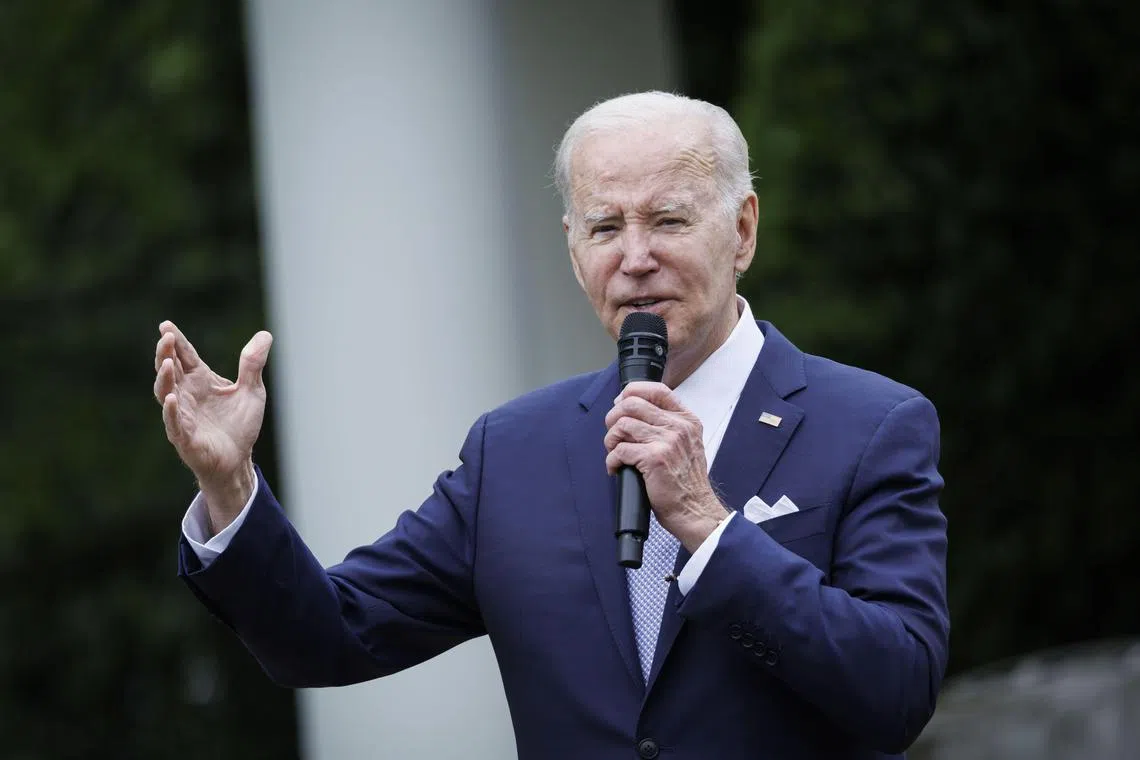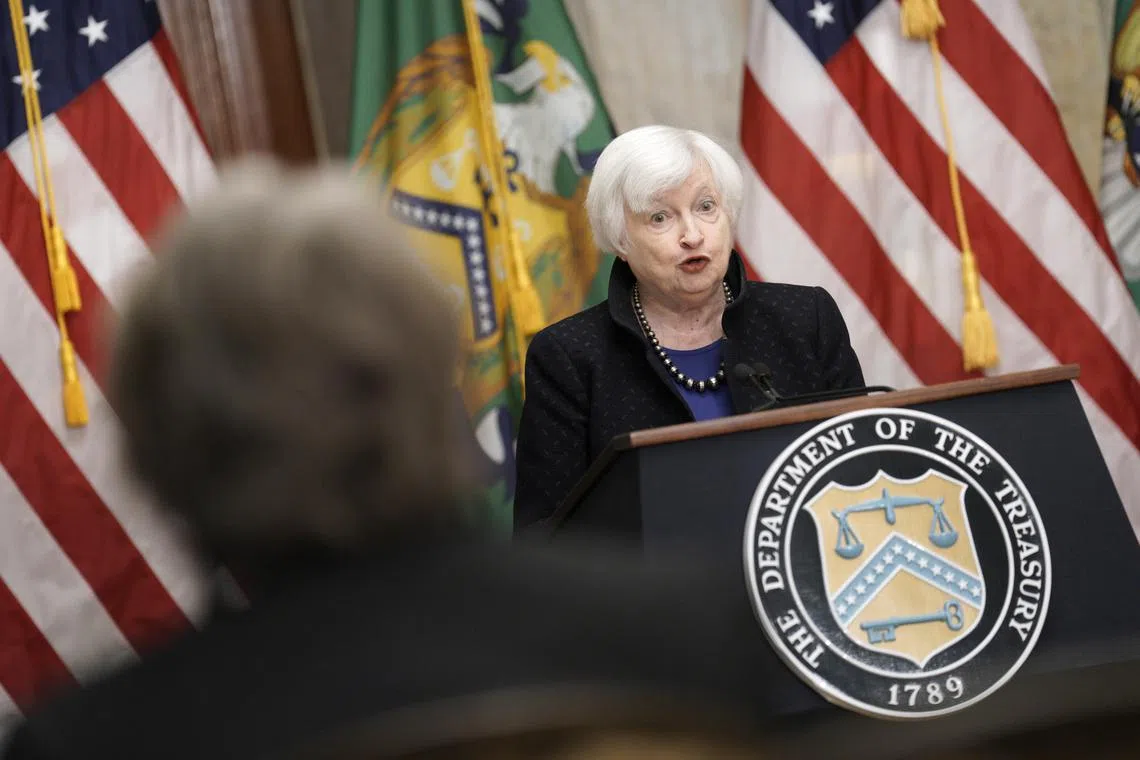US may default on June 1 without debt ceiling hike; Biden, McCarthy to meet
Sign up now: Get ST's newsletters delivered to your inbox

US President Joe Biden is said to have called a May 9 meeting with House and Senate leaders to discuss the debt ceiling.
PHOTO: BLOOMBERG
Follow topic:
WASHINGTON – US President Joe Biden on Monday summoned the four top congressional leaders to the White House next week after the Treasury warned that the government could run short of cash to pay its bills by June.
Treasury Secretary Janet Yellen said in a letter to Congress that the agency will be unlikely to meet all US government payment obligations “potentially as early as June 1” without action by Congress.
The estimate raised the risk that the United States is headed for an unprecedented default that would shake the global economy, adding new urgency to political calculations in Washington, where Democrats and Republicans were girding for a months-long stand-off.
Mr Biden called Republican House Speaker Kevin McCarthy in Jerusalem, where he is on a diplomatic trip, to invite him to a May 9 White House meeting. The two leaders have not sat down to discuss the issue since February.
Mr Biden also extended invitations to House Democratic leader Hakeem Jeffries, Senate Majority Leader Chuck Schumer and Republican leader Mitch McConnell.
Mr McConnell, who had a fall in March which sidelined him for weeks, said he and Mr Biden had a “good conversation” today, adding: “I’m sure we’ll be speaking again.”
House Republicans passed a Bill to raise the debt limit last week that includes steep cuts to spending – in areas ranging from healthcare for the poor to air-traffic controllers – that the Democratic-controlled Senate and Mr Biden say they will not approve.
Mr Biden has steadfastly said he will not negotiate over the debt ceiling increase, but will discuss budget cuts after a new limit is passed. Congress has often paired debt-ceiling increases with other budget and spending measures.
A White House official said Mr Biden, who had previously said he would not meet Mr McCarthy at all to discuss the debt limit, would “stress that Congress must take action to avoid default without conditions” on May 9.
The new potential “X-date”, which takes into account April tax receipts, is largely unchanged from a previous estimate, issued in January, that the government could run short of cash around June 5.
But Dr Yellen also added some wiggle room, noting that federal receipts and outlays are “inherently variable”. The actual date that Treasury exhausts extraordinary measures “could be a number of weeks later than these estimates”, she wrote.
“It is impossible to predict with certainty the exact date when Treasury will be unable to pay the government’s bills,” she wrote.
After hitting the US$31.4 trillion (S$41.9 trillion) borrowing cap on Jan 19, Dr Yellen previously told Congress that Treasury would keep up payments on debt and federal benefits and fund other spending by using extraordinary cash management measures.
One such step it is taking is suspending the sales of securities that state and local governments use to temporarily hold cash.
In 2011, a similar debt ceiling fight took the US to the brink of default and prompted a downgrade of the country’s top-notch credit rating. This time, negotiations may be even more difficult, veterans of 2011‘s face-off say.
Spending cut demands
The Bill passed last Wednesday by the Republican-led House would slash tax incentives for solar energy and implement US$4.5 trillion in spending cuts – or about 22 per cent – in exchange for a US$1.5 trillion increase in the US debt limit.
The Bill has no chance of passing the Democrat-controlled Senate, and the White House has said Mr Biden would veto the legislation if it did.
Budget analyst Shai Akabas at the Bipartisan Policy Centre said the short deadline underscored the urgency of finding a solution to the bitter stand-off, and that it dashed hopes that Congress could negotiate through the late summer months.
A potential default within weeks “is not a position befitting of a country considered the bedrock of the financial system, and only adds uncertainty to an already shaky economy”, he said.

US Treasury Secretary Janet Yellen said in a letter to Congress that the agency will be unlikely to meet all US government payment obligations “by early June, and potentially as early as June 1” without action by Congress.
PHOTO: NYTIMES
Dr Yellen’s vagueness on the actual default date is due to some fiscal events in June that could buy some breathing room.
If Treasury can make it past early June benefit payments, it could take in significant cash from quarterly estimated tax payments due on June 15, analysts say.
Then it could float until June 30, when it would be able to tap US$143 billion in borrowing by suspending reinvestment of maturing securities held by the government retirement funds.
Along with tax receipts, that borrowing would allow it to pay bills well into July.
Nonetheless, the US’ debt ceiling battles are likely to persist for years to come, with benefit programmes like Social Security and Medicare accounting for the largest category of the budget and projected to grow dramatically as the population ages.
As the current debate heats up, Mr Biden, who is seeking re-election in 2024, is using the House Republican proposal to tag his opposition as an economic threat to local economies. REUTERS

